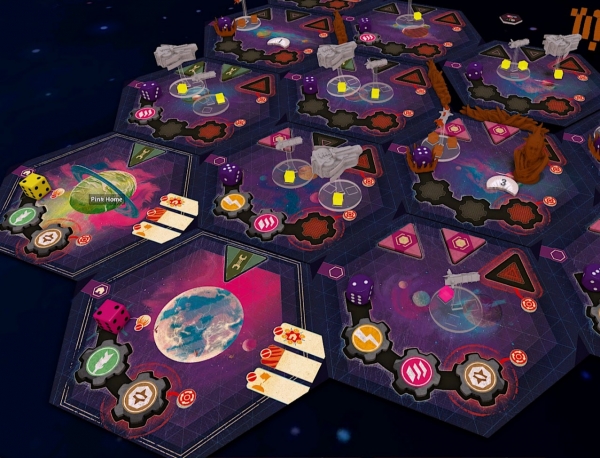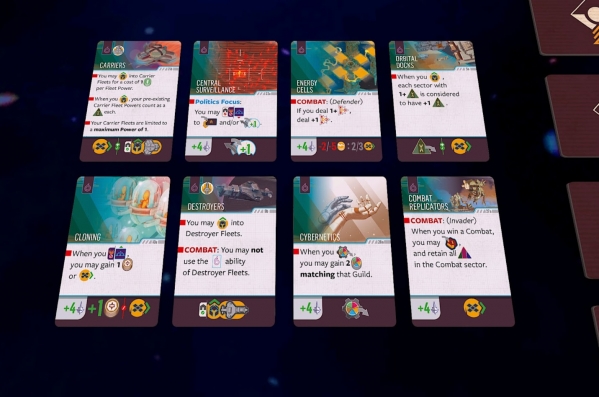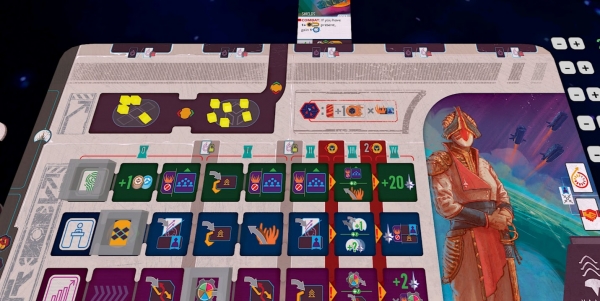Mindclash’s new space 4x by designers Nigel Buckle and Dávid Turczi is full of ideas, stemming from a stated goal to euroize the decision making in the galactic empire 4x genre.
To my surprise, their attempt to euroize the genre did not take the form of numerous low-stakes additive decisions as suggested by the point salad scoring. Rather, the game features knife-edge combination plays in the context of a relatively concise number of card plays and action choices. It’s this design economy, despite the overstuffed and over-euroglyphed box and board, that brought me around---though only after a number of halting plays earned hard-earned familiarity. Similarly, while it may appear to be an accountant’s dream, I was surprised to also find a crunchy combat system with substantial fighty incentives inside the box, especially when paired with an aggressively situated scenario.
The place to start with Voidfall, and really any game, is with a simple question: what will you be doing from turn to turn… and is it compelling? Crucially, I think the answer to the second question is strongly yes. Your play is driven by your hand of order cards, which each have three actions printed on them. You choose two of the actions printed on those order cards and perform those actions. You can only choose each card (e.g. “production,” “conquer”) once each cycle, which typically consist of 4-6 card plays total out of your hand of 9. The cards’ thematic descriptions are generally well chosen to give you a good sense of what your options will do before you’ve internalized their specifics. Its closest analog I’ve played before is the command card system from Fantasy Flight’s Runewars---this comparison was even more obvious in the much inferior earlier playtest version of Voidfall which even had the initiative system from Runewars’ command cards. The engine forces hard tradeoffs, as you sometimes won’t even be able to play more than half your cards in a cycle, and moreover concentrates the 4x decision making into around ten key decisions every turn. Which action cards will you play each cycle and which actions will you take on them? Carefully sequencing and chaining these actions along with when and where to spend other elements is fundamentally what Voidfall is about.

What surrounds the card engine are a number of satisfying and well-connected mechanisms that do a lot of heavy lifting thematically. The representation of trade, via trade tokens, is exceedingly clever, abstract, but ultimately richly evocative. Gaining trade tokens and connecting with commerce reduces your expensive upkeep, gets resources for nothing from the board, but spending them allows you to take three actions on a given card. Similarly, the tech system is almost perfectly weighted. Each tech you gain feels like a superpower, combines well with other techs, and, especially in their advanced forms, can form the cornerstone of some unique form of play. Drafting agenda cards allow you to carefully craft your victory conditions, giving you a strong sense of purpose and avoiding aimless “what should I be doing?” sandbox eurogame feelings, but picking them up scales up your empire upkeep quite quickly. I have only dipped my toes into the non-base game houses but there is a lot of variety there, and even starting with a different technology provides a great deal of differentiation, without getting into the unique House powers. In sum, a lot of the little touches around the edges fit together beautifully.

Big picture, the most unusual feature of Voidfall is that the economic engine is fun to play around with, moreso than Eclipse from my brief experience with that. The core domestic puzzle is compelling. A compliment I can give this game as a 4x is that it makes tall empires fun. You can’t really get away with making no invasions whatsoever, you’ll need an extra system or two to pack with guilds, but you can mostly focus on moving up your internal tracks, increasing population, and placing guilds to fill your sectors if you get the right tech and choose the right cards. Deciding when to produce, when to develop, and which agendas will score sufficiently to make it worth your while is basically a good time. And with that said, in all game modes you need to cognizant of Voidborne invasions and in competitive you’ll need to dip into military tech enough to dissuade your opponents from invading.

This all comes at a significant cost, however. First games, before you have internalized the incredible wave of euroglyphics, are a headache inducing tangle. There are almost hundreds of different euroglyphs which, while mostly logical, all sometimes need to be looked up in the comprehensive glossary and icon reference. It is a pace killer and a time sink. Moreover, it’s simply difficult to plan out a strategy when you don’t have any basic recall regarding what the various common order cards do, what actions generally cost, and how to mostly get what you want. That said, once you know your order cards, tracks, and techs broadly the game does speed up considerably. The galaxy board, in particular, deserves a special shout out for almost perfectly compressing the complex procedure of a cycle into a concise notated shared board. At first, I thought this would be a 1-2 player game exclusively, something I still think is true about solo/co-op, but with some familiarity it’s possible to work through games in a reasonable 2 ½-3 ½ hour period for even a 3-4 player game. Like many of Mindclash’s other games, this is not a game that drags on; it has a tight economy of turns and only three cycles to score your points. Still, though, I simply would not play this game with someone too focused on perfect efficiency. You have to know your players with a game like this that requires highly efficient action sequencing… or I guess literally get the timer out.
Another narrow miss that is still quite entertaining is the solo/co-op system. The solo/co-op system is tight, balanced, and good fun to play against---a score off against the board. Most of my games are in this mode. But it is missing the sense of any coherent, even if unknowable, opponent. The skirmishes and war system for the Voidborne works, but a great deal of the AI challenge comes from cards that are flipped up and accumulate which can be dispensed by taking on an arbitrary bad or by fulfilling an arbitrary condition. Spend this. Invade a system with this many units. That sort of thing. None of it really builds to anything, even if it is challenging. Compare to something like the triumph of the Navajo Wars/Comancheria game opponent system which has similar conveyer belt random elements but gives a strong sense of a cohesive, motivated but hard to predict colonial opponent. Or the cohesive Spirit Island opponent. I could still see buying the game for this mode, there are a lot of things to like, but it is just a touch athematic and sterile in its puzzle.
By contrast to solo/co-op, the competitive mode is rules clean and straightforward. It still features some Voidborne hijinks, but by and large most of the unpredictability is provided by your opponents. My first competitive game of this was eye opening. The mechanics were simpler, but as soon as I came near my opponent it threw an unpredictable wrench in my deterministic planning in the best possible way, without the rules grit of trying to be prepared for card flips or fulfill random conditions. I think this is an excellent competitive game that people are going to be surprised by with the more aggressive scenario setups. Even with deterministic combat Voidfall can be mean and could absolutely feature hard climactic fighting. This is not the peace 4x it might first seem, though it does subtly eliminate most incentives to beat up overly much on any already beaten opponent and instead encourages fights to take down the biggest bully with the glory token system. I think, however, the competitive mode will be greatly enhanced by the promised quick combat calculator web app. In solo/co-op, this is not a problem, as the Voidborne are very simple to calculate in the deterministic system, but fighting between competitive opponents with different techs can be opaque and a little math to work through. Given how knife edge combat is, this is not a desirable feature and I’d be glad to see the app.
Summing up my thoughts on Voidfall is hard and I still have a lot to explore, although I'm confident I have firmed up my basic assessments. I originally declined backing it after playing the playtest version on TTS, only to spend a little extra to get a kickstarter copy now that I’ve played 10-12 or so games of the final TTS version---there’s just something here. Voidfall is dense, combination focused, and unforgiving of mistakes in sequencing and orders. It is a game where you have triple digit scores at the end and compare scores to win. Do I recommend it? Hard to say. A lot of games I love I don’t necessarily recommend; see my review of Arkham Horror LCG. Voidfall is a game I wouldn’t play with most people simply due to the long moments of staring at cards, wondering what you should do, and occasional takebacks and rollbacks that will almost certainly follow. It strikes me that if you like this sort of design, you know who you are. But if you don’t like carefully figuring out what order to play your cards and actions in so that you can invade, pay for a new sector defense/shipyard, and then have enough materials left over to reinforce your sector to stave off the Voidborne within two order cards, you won’t like this. It does what it says on the tin: adds a heavy euro economic game to the management of domestic affairs while, surprisingly, only lightly pulling back on the military angle of a typical 4x. I want to credit a friend and frequent Voidfall opponent, who summed up what I’ve spent a thousand words saying in a single comparison: Voidfall is to space 4x what Mage Knight is to adventure games.
 Games
Games How to resolve AdBlock issue?
How to resolve AdBlock issue? 




















